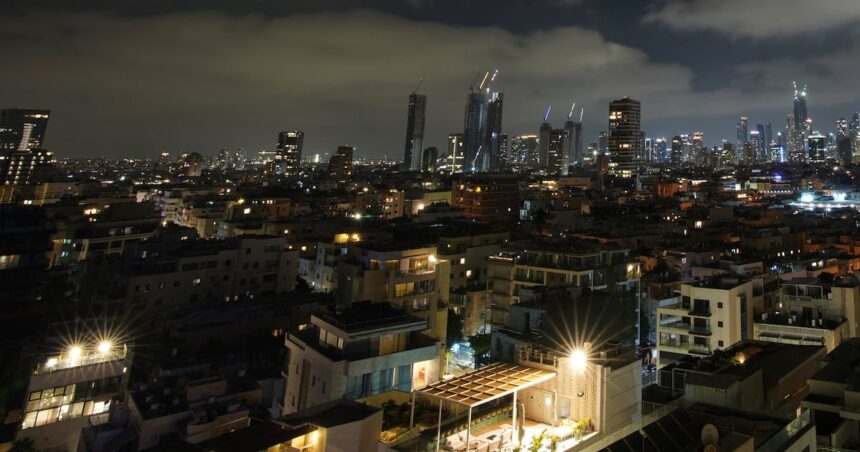The desert night sky over Tel Aviv erupted with flashes of light Tuesday as Israel’s Iron Dome intercepted dozens of Iranian ballistic missiles, marking the most direct military confrontation between the two adversaries in decades. Standing amid air raid sirens with local residents in a shelter, I witnessed firsthand the mixture of defiance and fear that has become all too familiar in this escalating regional powder keg.
“We’ve been expecting this for weeks,” Noam Levitzky, a 43-year-old software engineer told me as we huddled in the shelter. “But expecting it and experiencing it are two very different things.“
Iran launched approximately 180 missiles toward Israel in what Tehran described as retaliation for Israel’s killing of Hezbollah leader Hassan Nasrallah and Hamas political chief Ismail Haniyeh. Israeli officials reported that the vast majority of the projectiles were intercepted, with only minor damage recorded and no casualties initially reported—a testament to Israel’s multi-layered air defense systems.
The response from Jerusalem was swift and unambiguous. Prime Minister Benjamin Netanyahu convened an emergency war cabinet meeting, emerging with a clear message: “Iran made a big mistake tonight and will pay for it.” Defense Minister Yoav Gallant echoed this sentiment, stating that Israel’s response would come “in ways and places that Iran does not expect.”
This missile barrage represents a dangerous new phase in a conflict that has been expanding since the October 7, 2023 Hamas attack on Israel. What began as an Israel-Hamas war has progressively drawn in Hezbollah, the Houthis in Yemen, and now Iran in increasingly direct ways.
Pentagon spokesperson Sabrina Singh confirmed that U.S. forces assisted in intercepting the Iranian missiles, underscoring Washington’s commitment to Israeli security despite growing tensions between the Biden administration and Netanyahu government over the handling of the Gaza conflict.
“We detected, tracked, and intercepted numerous missiles aimed at Israel,” Singh stated. “The United States stands firmly with Israel against Iranian aggression.“
The missile exchange occurred against the backdrop of stalled ceasefire negotiations for Gaza. Egyptian officials involved in the talks expressed frustration that this escalation further complicates already tenuous diplomatic efforts.
“Every missile fired pushes peace further away,” said an Egyptian diplomatic source speaking on condition of anonymity. “We’re now working to prevent a total regional war rather than just secure a Gaza ceasefire.”
On the streets of Tehran, the government organized rallies celebrating the missile launch, with state television showing crowds chanting anti-Israel slogans. However, Iranian social media revealed a more complex picture, with many ordinary Iranians expressing concerns about being drawn into a broader conflict while the country grapples with economic hardship.
The Israeli military’s options for retaliation remain unclear, though military analysts suggest targeting Iranian nuclear facilities or oil infrastructure could be on the table. Brigadier General (ret.) Assaf Orion of Israel’s Institute for National Security Studies told me that Israel faces a difficult calculus.
“They need to respond forcefully enough to establish deterrence but not so aggressively that it triggers an all-out war that nobody wants,” Orion explained. “The precision of their targeting will speak volumes about their strategic objectives.“
International reaction has been swift. The UN Security Council has scheduled an emergency session, while European leaders have called for de-escalation. Germany’s Chancellor Olaf Scholz condemned Iran’s “reckless attack,” while France’s President Emmanuel Macron called for “all parties to exercise maximum restraint.”
Oil markets reacted immediately, with Brent crude jumping nearly 4% on fears of supply disruption should the conflict impact Iranian oil exports or Strait of Hormuz shipping. The International Energy Agency has already begun consultations about potential emergency oil reserve releases if the situation deteriorates further.
For civilians caught in this dangerous standoff, the reality is increasingly grim. In northern Israel, communities already evacuated due to Hezbollah rocket fire now face the additional threat of Iranian missiles. And in Gaza, humanitarian workers report that each regional escalation further complicates already challenging aid delivery efforts.
“Every time there’s a new front in this expanding conflict, the attention and resources get diverted,” explained Juliette Touma of UNRWA. “Meanwhile, the humanitarian situation in Gaza continues to deteriorate.”
Military analysts are particularly concerned about what Israeli retaliation might look like and how Iran might respond to a second round of strikes. The risk of miscalculation is high, with the potential to draw other regional actors—and potentially global powers—into a broader conflict.
As dawn broke over Tel Aviv Wednesday, residents emerged cautiously from shelters to survey the aftermath. The physical damage was minimal, but the psychological impact and strategic implications are profound. This exchange of fire represents the most direct confrontation between Israel and Iran in their decades-long shadow war, and few believe it will be the last.
Standing on a Tel Aviv rooftop as the morning sun illuminated the Mediterranean, the question hanging in the air wasn’t if Israel would strike back, but when—and whether the region could avoid the all-out war that now seems closer than ever.






